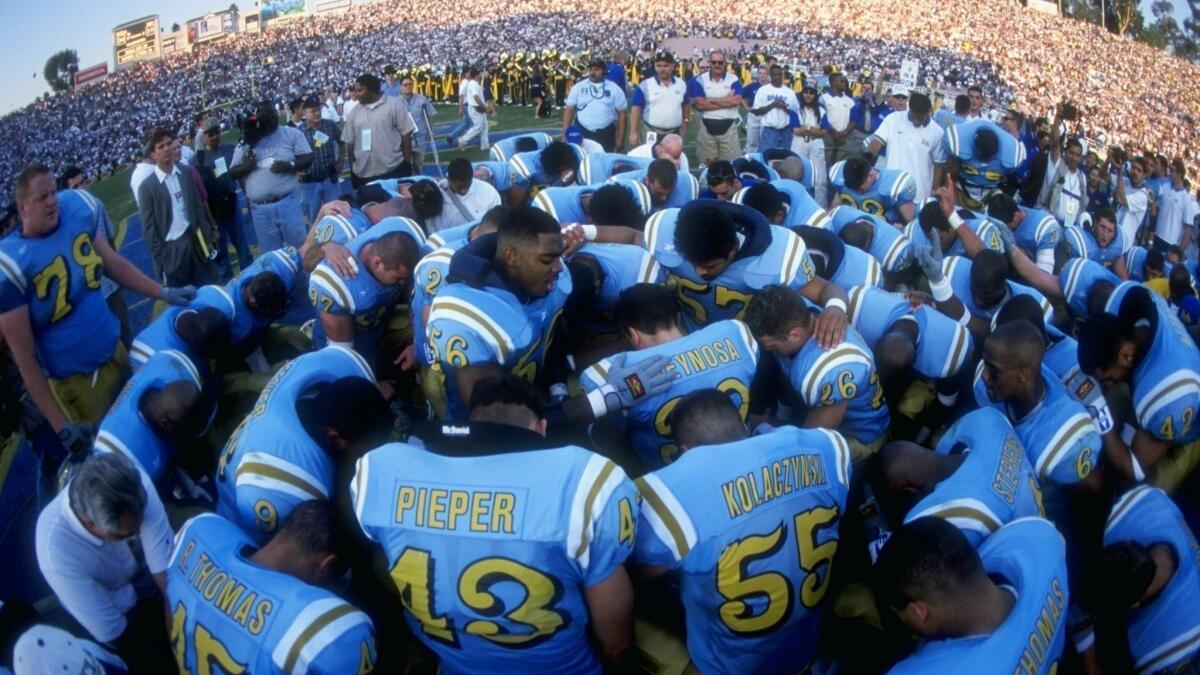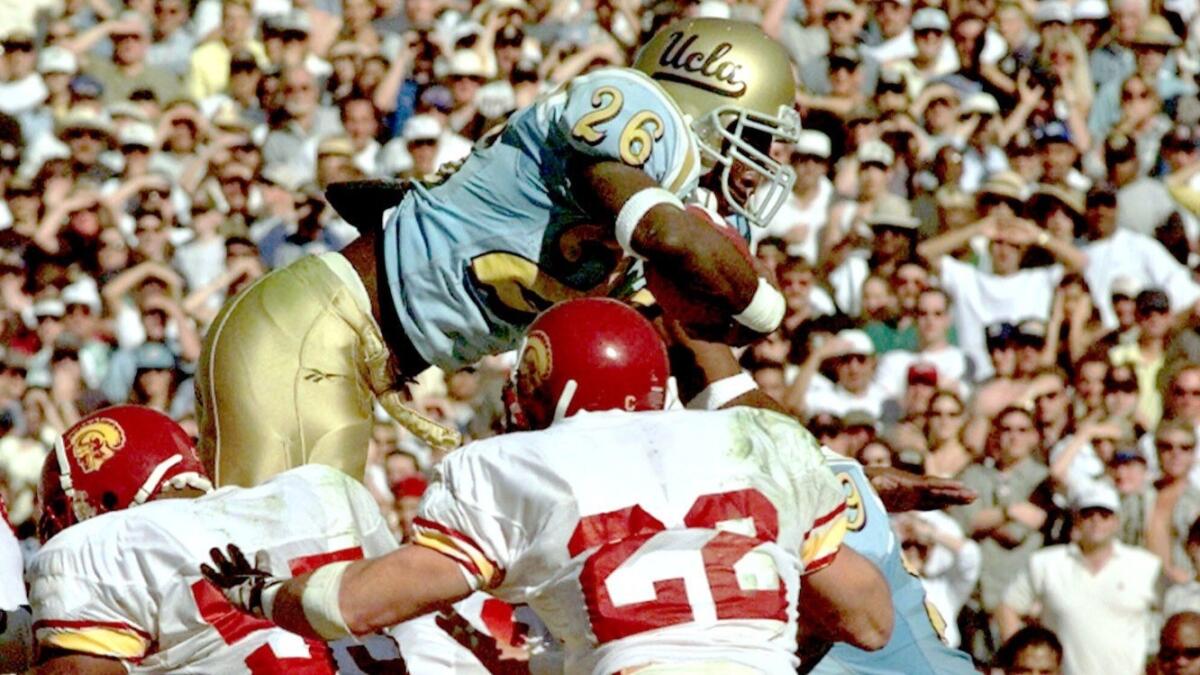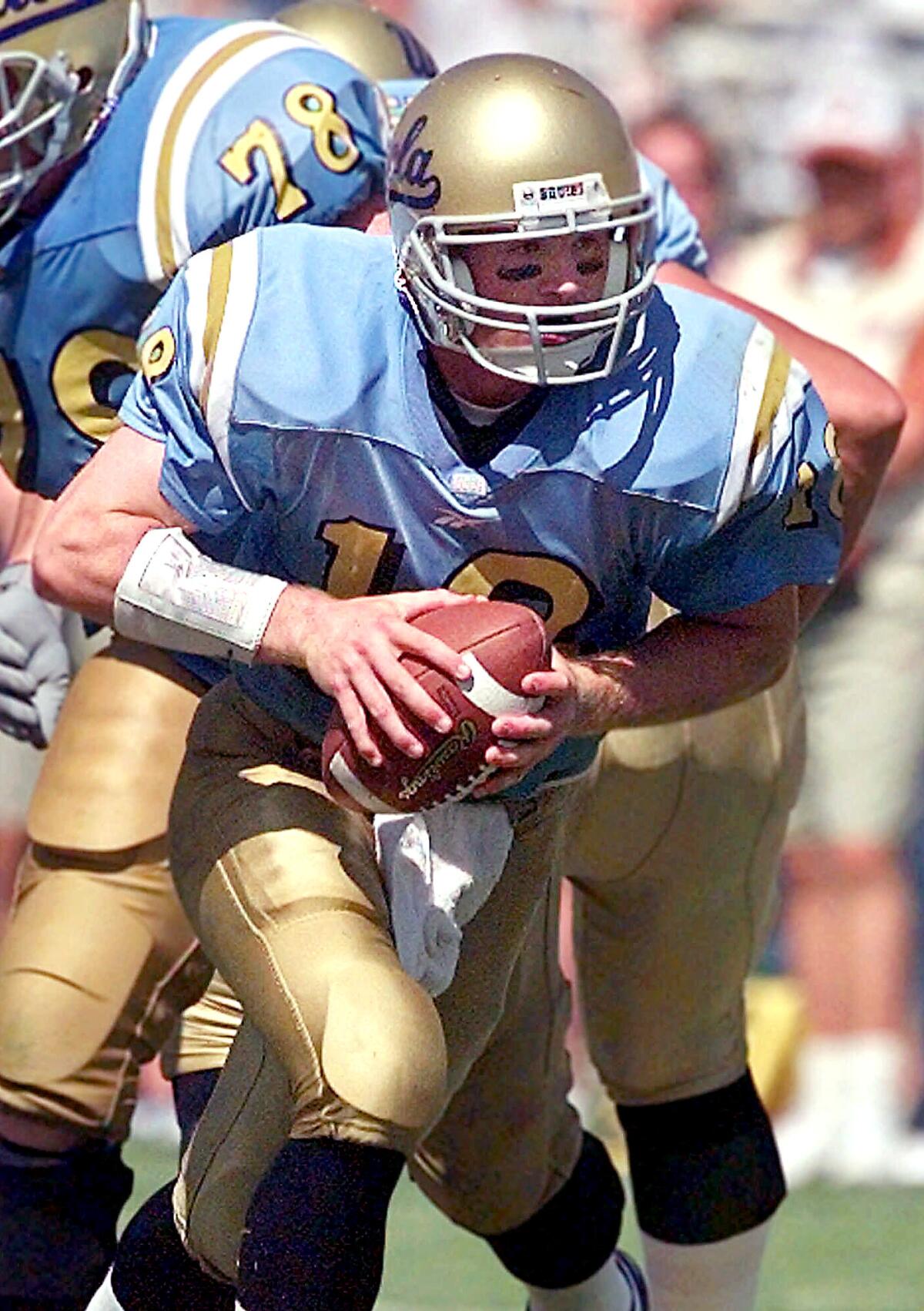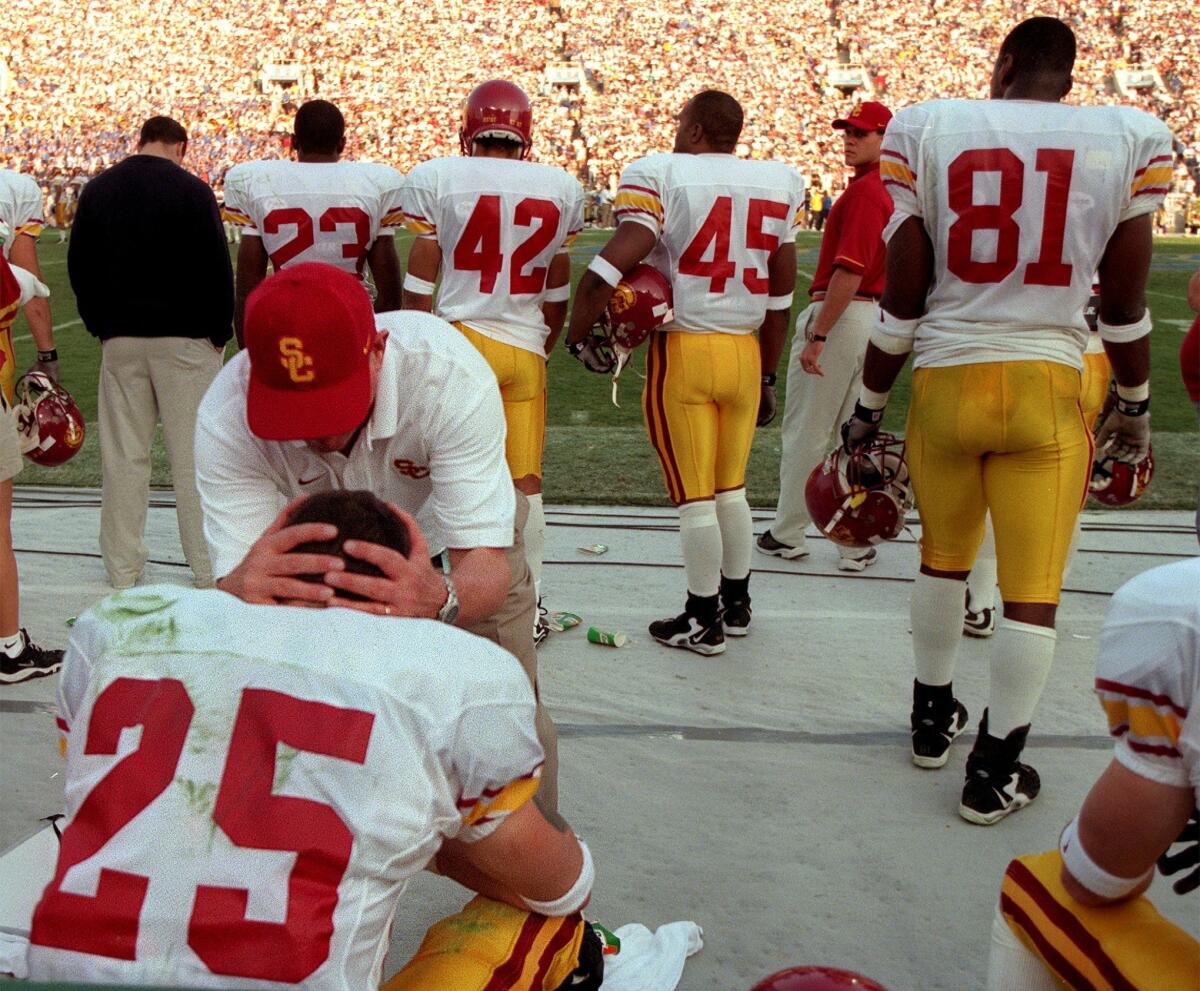1998 UCLA vs. USC: Cade McNown leads Bruins’ most dominant reign over the Trojans

- Share via
“Fight On,” USC’s venerable fight song, hasn’t irritated Cade McNown over the last two decades whenever he’s heard the blaring trumpets of his longtime rival.
It’s the soundtrack to his greatest success.
“I love hearing that fight song, I tell people,” the former UCLA quarterback said recently with a laugh, “because it reminds me of victory.”
The Bruins had won four consecutive games in the crosstown rivalry when McNown arrived on campus to carry on his school’s new favorite tradition. McNown helped UCLA edge USC in each of his first three seasons, never by more than a touchdown and once in double overtime, to set up a historic opportunity in the 1998 game.
A victory over the Trojans at the Rose Bowl on that warm November day would make McNown the only starting quarterback in the history of a series that dated to 1929 to go 4-0 in the rivalry.
Far more important were the implications for his team. UCLA was ranked No. 3 in the country and jostling with Tennessee, Kansas State and Florida State to appear in the Fiesta Bowl, which would host the first-ever Bowl Championship Series national title game. The Bruins entered the rivalry game No. 2 in the BCS standings, trailing only the Volunteers.
“We were hoping we could get there and play Tennessee,” former UCLA receiver Danny Farmer recalled, “because they had beaten us two years before with Peyton Manning.”
The Bruins were also approaching what could have been considered the high-water mark in program history. They had won a school-record 19 consecutive games going back to early in the ’97 season, giving them a sustained run of success unlike any other.

United Press International had awarded UCLA a share of the national championship in 1954, but the Bruins lost two games the season before and the season after. UCLA went to four major bowls in succession from 1982 to ’85 under coach Terry Donahue but never finished ranked higher than fifth nationally.
This was a chance to close a season as an undisputed champion for the first time.
Standing in the way of the 9-0 Bruins were the 7-3 Trojans, relying on a freshman quarterback by the name of Carson Palmer who was making only his third career start and far removed from the form that would help him win the Heisman Trophy four years later.
Anxiety was not running high in Westwood. UCLA’s offense featured the precision of a professional team, averaging 40.7 points per game. The Bruins also had their rival’s number going all the way back to 1991.
“We felt like we had the edge on them mentally because we had won seven games in a row,” Farmer said, “so we were going into that very confident, but not cocky, and thought we could do what we could to win the game and obviously put ourselves in a position to win a championship.”
That conviction didn’t waver, even after McNown’s first pass was intercepted as the result of a crunching hit from Trojans linebacker Chris Claiborne that forced the ball to be bobbled into the air. McNown had a way of soothing every worry, no matter how severe, that had crept into his teammates over the previous two seasons.
“He was truly something special to watch and be in the huddle with,” Bruins offensive tackle Kris Farris said. “He could make magic happen at any time, so you never really felt like you were out of a game.”
UCLA held USC to a field goal after the turnover and then did a very smart thing — the Bruins kept getting the ball into the hands of DeShaun Foster.
The freshman running back scored the Bruins’ first touchdown when he caught a four-yard pass out of the backfield. Sloughing off the effects of strep throat, which necessitated antibiotics and forced him into isolation at the team hotel, Foster later hurdled defenders on a touchdown run midway through the first quarter, extending UCLA’s advantage to 14-3.
By the time he was finished, Foster would score four touchdowns, including three on the ground while rushing for 105 yards.
“I actually wanted to be sick for every game,” quipped Foster, who is now the Bruins’ running backs coach.

UCLA’s 27-10 halftime lead led to what might have felt like an extended celebration for the Bruins fans among the crowd of 88,080. With just under three minutes left, a chant of “Eight more years!” spread through the Rose Bowl, prompting UCLA linebacker Brendon Ayanbadejo to nod in approval.
The final gesture in the Bruins’ 34-17 triumph belonged to McNown, who faked a pitch and sprinted 23 yards on the last play before leaping into the arms of guard Andy Meyers. McNown flung the ball into the air in celebration, having turned UCLA’s four-game winning streak in the rivalry upon his arrival into an eight-slap.
“I was just filling in where everybody else left off,” McNown cracked.
The Bruins had won 20 consecutive games, leaving them feeling on top of the college football world even if they never got that desired matchup with Rocky Top.
A rescheduled game against Miami two weeks later that UCLA coach Bob Toledo had dubbed the Hurricane Bowl turned into a whirlwind of disappointment. The Bruins lost a 38-21 lead after the Hurricanes turned two fumble recoveries — including one that would have been overturned had instant replay existed — into fourth-quarter touchdowns. Miami’s 49-45 victory at the Orange Bowl made the Bruins the first team to qualify for the Rose Bowl as a consolation prize.
That didn’t go well either, Wisconsin and tailback Ron Dayne stomping the Bruins on the way to a 38-31 victory. UCLA hasn’t been back to the Rose Bowl game since.
“I think the whole team kind of fell apart,” Farris said. “That Miami game was such a heartbreaker for us that it was hard to come back from and really focus on making sure we went back and played another complete game at the Rose Bowl.”
The Bruins were left to reconcile the letdown of their final two games with their earlier dominance, particularly against their rival. McNown said he didn’t think much of having become the only UCLA quarterback to notch four victories against USC until he was introduced as such during a Bruins basketball game at Pauley Pavilion.

“People went crazy,” said McNown, who returned to Los Angeles to work in asset management after his four-year NFL career ended, “and I thought, oh, wow, I guess that was going to be an important distinguishing fact going forward.”
Follow Ben Bolch on Twitter @latbbolch
Go beyond the scoreboard
Get the latest on L.A.'s teams in the daily Sports Report newsletter.
You may occasionally receive promotional content from the Los Angeles Times.




